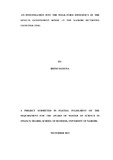| dc.description.abstract | This study investigates the Weak form Efficiency of the Kenyan Government Bonds at the Nairobi Securities Exchange. According to Weak form Efficient Market Hypothesis literature, a price series is considered to be weak form efficient if it is non-stationary, uncorrelated and of normal distribution. Therefore the objectives of this study were to establish whether the bonds prices are non-stationary, uncorrelated and that they follow a normal distribution.
A subsample of forty government bonds which are listed on the Nairobi Securities Exchange and were outstanding as at 30th June 2013 was used in the analysis. Secondary daily price data of the forty government bonds for the period between January 2009 and June 2013 were used to test efficiency. KPSS unit root was used to test non-stationarity, autocorrelation test was used to check for correlation, K-S and Shapiro Wilk tests and Skewness Kurtosis were used to check for normality while runs test was used to check for randomness. The KPSS unit root test results implies that the data series are non-stationary while autocorrelation test results indicates there is correlation between the past and future prices. K-S and Shapiro Wilk tests results as well as Skewness and Kurtosis results indicate that the price series does not follow a normal distribution while runs test results indicates the price series as not being random.
The results of this study show that although the price series are found to be non-stationary, they are also found to be correlated and having a non-normal distribution. Therefore based on the results, the Kenyan Government Bonds at the Nairobi Securities exchange cannot be said to be weak form efficient. Efficiency can be improved by CBK’s actions to actively promote financial literacy in order to elicit more players and activity in the bonds market. This will increase market confidence through increased participation and therefore further enhance market deepening. | en |

